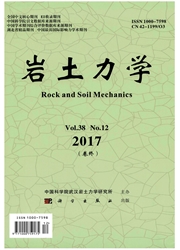

 中文摘要:
中文摘要:
将模糊综合评判方法应用于岩体分类可造成评判信息丢失,影响评判结果的准确性和可信度。针对该缺陷,引入模糊集重心理论,克服了综合评判方法中某些因素由于权值较小而被“淹没”的现象。在此基础上,选取了岩石质量指标、单轴抗压强度、岩体完整性系数、岩石软化系数、最大地震烈度和地下水渗水量这6个对岩体质量及其稳定性影响比较大的因素,以正态分布作为其隶属函数,采用加权平均值法确定各因素权重值,建立了基于模糊集重心理论的岩体模糊分类方法。结合具体的工程实例,阐明了上述各因素模糊集重心的计算方法。利用基于模糊集重心的岩体模糊分类方法,研究了某一地下工程围岩的稳定性级别,并与模糊综合评判方法计算的结果和围岩的实际稳定情况进行了对比,验证了方法的准确性和适用性。
 英文摘要:
英文摘要:
The method of fuzzy synthetical assessment applied to rock mass classification results in losing information of judgment, then influences veracity and reliability of the result. In allusion to the limitation, the theory of barycenter of fuzzy set is imported. Because weights of some factors is relative small, if using usual fuzzy synthetical assessment method, it will result in phenomenon of "submerge". However, this problem does not exist now. Based on this theory, the six more important influential factors for rock mass classification such as index of rocky quality, uniaxial strength of renitency, integrated modulus of rock mass, soft modulus of rock, maximal seismic intensity and osmotic quantity of groundwater, are chosen; then the normal distribution as its membership function and the theory of the mean are used based on proportion to conform weights of the whole factors. Thus the method of rock mass fuzzy synthetical classification based on the theory of fuzzy set has been established. The calculational method of barycenter of fuzzy set of the whole factors is clarified combining a material project example. Finally, the method of rock mass fuzzy classification based on the theory of barycenter of fuzzy set is used to research the steady classification of a certain underground wall rock. Compared to the result of the method of fuzzy synthetical assessment and the actual steady instance of the wall rock, the veracity and the applicability of the textual method are validated.
 同期刊论文项目
同期刊论文项目
 同项目期刊论文
同项目期刊论文
 期刊信息
期刊信息
